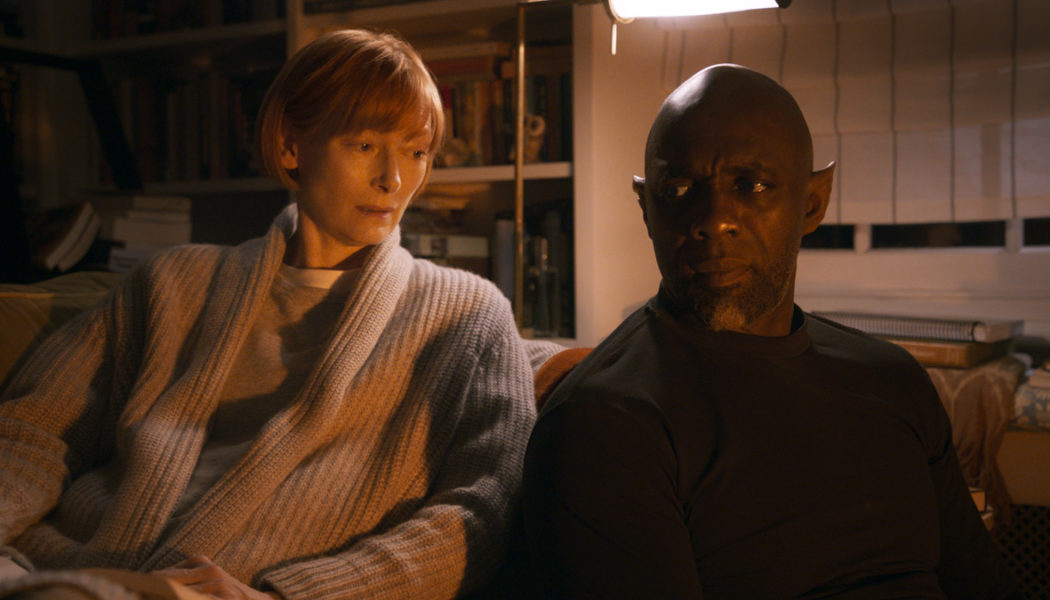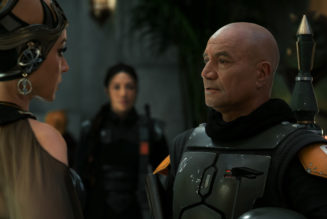The Pitch: Alithea (Tilda Swinton) is an aloof and solitary scholar who travels to Istanbul for a conference; browsing through the markets one day, she purchases a small glass bottle that intrigues her. Back at her hotel room, she uses her electric toothbrush to clean some dirt off the bottle, and poof! Out comes a Djinn (Idris Elba) who, after taking a few minutes to catch up with the 21st century and the existence of the English language, does his job and offers Alithea three wishes.
Alithea, though, is a scholar of mythology, and so she’s immediately wary of the Djinn’s offer, given the centuries of precedent which suggests that no good can come of magical wishes. So she asks the Djinn to tell her his life story: How he came to be imprisoned in the bottle, and why he has been imprisoned for centuries upon centuries. His tales, which go back to the Queen of Sheba’s reign, evolve into an unconventional, sweet and sad little love story — as told by the guy who, y’know, made the Mad Max movies.
A Long Time Ago… Director George Miller’s original plan for Three Thousand Years of Longing, based on a short story by A.S. Byatt, was to go into production in early 2020; for pandemic-related reasons, filming didn’t begin until later that year. That’s worth mentioning because of how curiously big and small the scope of the film is, in ways that might speak to it being a project conceived of during the pandemic, when stories about two people sitting in a room together and talking felt more safe to tell on screen than, say, a big massive epic.
Related Video
While not originally meant to be a pandemic project, there is plenty of sitting around and talking in Three Thousand Years (there’s a joke to be made about how for a lot of people, “hang out in a hotel room with Idris Elba in a bathrobe” would be all they ever wish for). But interwoven with those sequences are the Djinn’s stories, which bring long-since-vanished palaces and battlefields to life for Alithea’s enjoyment.
As big and cinematic as some of these sequences get, all of the Djinn’s stories are ultimately about love — requited or unrequired, tragic or true — and the gentle, tender bond that forms between him and Alithea through this storytelling ends up becoming the core narrative of the film — even after a few tragic twists.
The Genie and the Scholar: There’s more to the cast, including Matteo Bocelli (Andrea Bocelli’s son!) making his screen debut as a Prince of ancient times, but the project primarily exists as a two-hander — and, frankly, Swinton and Elba together is the rom-com casting real film fans want, and while their roles could objectively not be more different, the common ground of good manners that both characters find provides a strong foundation for the film’s narrative.
Three Thousand Years of Longing Review
” data-image-caption=”
Three Thousand Years of Longing (MGM)
” data-medium-file=”https://consequence.net/wp-content/uploads/2022/08/three-thousand-years-of-longing-idris-elba-tilda-swinton-2.jpg?quality=80&w=300″ data-large-file=”https://consequence.net/wp-content/uploads/2022/08/three-thousand-years-of-longing-idris-elba-tilda-swinton-2.jpg?quality=80&w=1024″ loading=”lazy” class=”size-large wp-image-1235504″ src=”https://consequence.net/wp-content/uploads/2022/08/three-thousand-years-of-longing-idris-elba-tilda-swinton-2.jpg?quality=80&w=1024&resize=1031%2C580&strip” alt=”Three Thousand Years of Longing Review” width=”100%” srcset=”https://consequence.net/wp-content/uploads/2022/08/three-thousand-years-of-longing-idris-elba-tilda-swinton-2.jpg 1200w, https://consequence.net/wp-content/uploads/2022/08/three-thousand-years-of-longing-idris-elba-tilda-swinton-2.jpg?resize=150,84 150w, https://consequence.net/wp-content/uploads/2022/08/three-thousand-years-of-longing-idris-elba-tilda-swinton-2.jpg?resize=300,169 300w, https://consequence.net/wp-content/uploads/2022/08/three-thousand-years-of-longing-idris-elba-tilda-swinton-2.jpg?resize=768,432 768w, https://consequence.net/wp-content/uploads/2022/08/three-thousand-years-of-longing-idris-elba-tilda-swinton-2.jpg?resize=1024,576 1024w, https://consequence.net/wp-content/uploads/2022/08/three-thousand-years-of-longing-idris-elba-tilda-swinton-2.jpg?resize=1031,580 1031w, https://consequence.net/wp-content/uploads/2022/08/three-thousand-years-of-longing-idris-elba-tilda-swinton-2.jpg?resize=590,332 590w, https://consequence.net/wp-content/uploads/2022/08/three-thousand-years-of-longing-idris-elba-tilda-swinton-2.jpg?resize=278,156 278w, https://consequence.net/wp-content/uploads/2022/08/three-thousand-years-of-longing-idris-elba-tilda-swinton-2.jpg?resize=173,97 173w, https://consequence.net/wp-content/uploads/2022/08/three-thousand-years-of-longing-idris-elba-tilda-swinton-2.jpg?resize=140,79 140w, https://consequence.net/wp-content/uploads/2022/08/three-thousand-years-of-longing-idris-elba-tilda-swinton-2.jpg?resize=198,111 198w, https://consequence.net/wp-content/uploads/2022/08/three-thousand-years-of-longing-idris-elba-tilda-swinton-2.jpg?resize=674,378 674w” sizes=”(max-width: 1024px) 100vw, 1024px”>
Three Thousand Years of Longing (MGM)
[flexi-common-toolbar] [flexi-form class=”flexi_form_style” title=”Submit to Flexi” name=”my_form” ajax=”true”][flexi-form-tag type=”post_title” class=”fl-input” title=”Title” value=”” required=”true”][flexi-form-tag type=”category” title=”Select category”][flexi-form-tag type=”tag” title=”Insert tag”][flexi-form-tag type=”article” class=”fl-textarea” title=”Description” ][flexi-form-tag type=”file” title=”Select file” required=”true”][flexi-form-tag type=”submit” name=”submit” value=”Submit Now”] [/flexi-form]










Tagged: Alternative Music, FEATURES, Film, Film Reviews, George Miller, Idris Elba, music blog, Reviews, Tilda Swinton